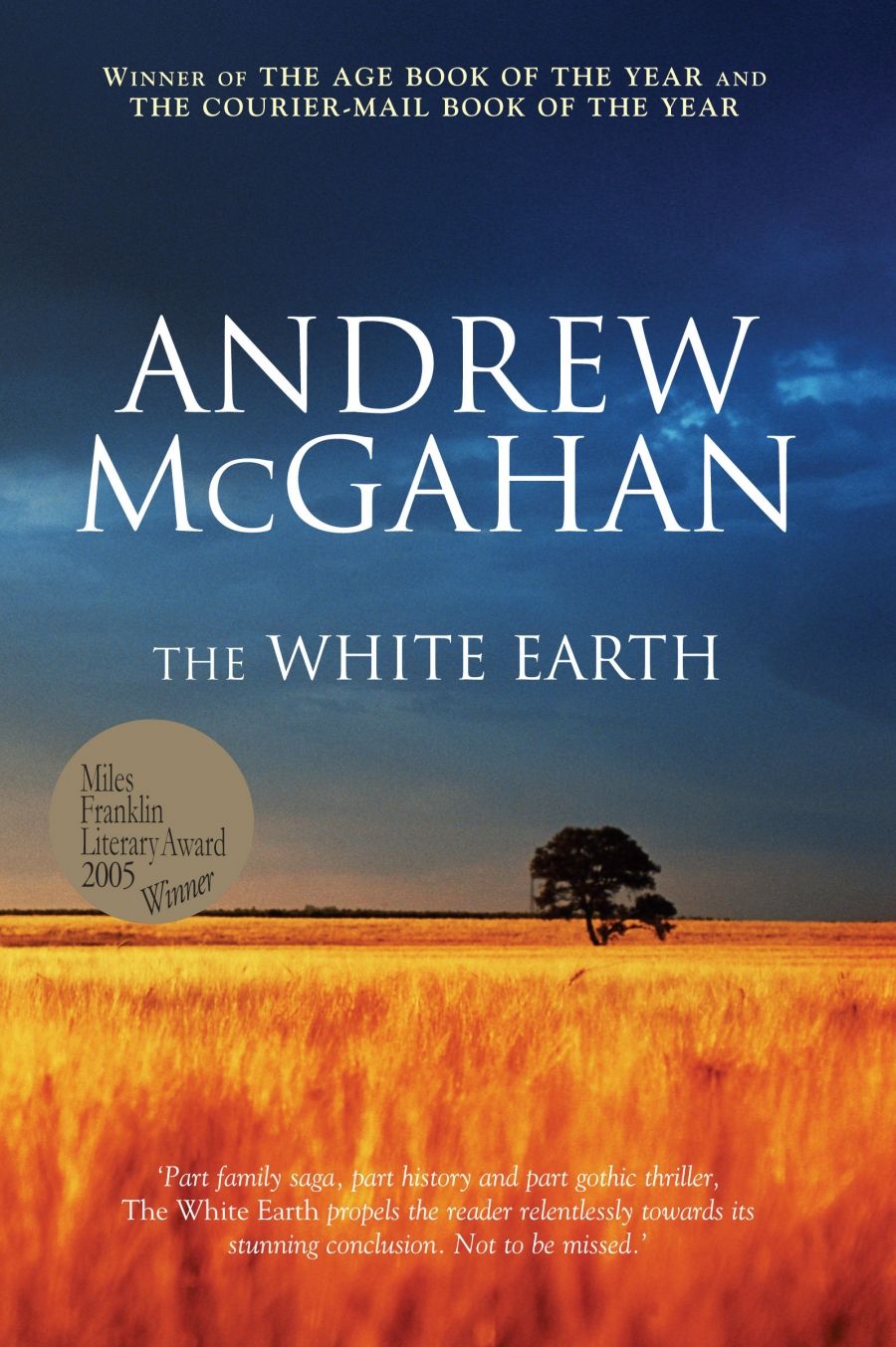
- Free Article: No
- Contents Category: Fiction
- Custom Article Title: James Bradley reviews 'The White Earth' by Andrew McGahan
- Review Article: Yes
- Online Only: No
- Custom Highlight Text:
‘White’ and ‘earth’ are not words that sit easily together in an Australian context, so much so that placing them thus seems almost deliberately unsettling. Juxtaposed, they only serve to remind us of things that are mostly too hard for us to look at directly, a claim to a possession all know to be ill-founded ...
- Book 1 Title: The White Earth
- Book 1 Biblio: Allen & Unwin, $29.95 pb, 392pp, 1741141478
- Book 1 Readings Link: booktopia.kh4ffx.net/o1M7m
Yet there is another implication contained within their conjunction, an implication that is somehow more troubling, less easily resolved, one that suggests that the claims of those who came later to possession, at least in a spiritual sense, might be just as real as those of the land’s original inhabitants. As one of the characters in Andrew McGahan’s The White Earth observes: ‘[L]and has to belong to someone to really come alive. It needs a human being to hear it and see it and to understand everything about it – where it came from, where it’s going. Otherwise it’s just a piece of ground.’
Of course, this isn’t new territory for McGahan. His prequel to Praise (1992), 1988 (1995), explored similar questions, albeit filtered through McGahan’s fictional alter ego, the hapless Gordon. But in The White Earth they take on new and often worrying shapes, probing the slippery and dangerous ambiguities that lie between possession and belonging, and the human costs of the power that springs from them.
With its gothic trappings and mythic resonances, The White Earth sometimes seems almost as far from McGahan’s last novel, Last Drinks (2000), as is possible. Gone is the sleaziness of Bjelke-Petersen’s Queensland; in its place stands a ruined house upon a ruined property in Queensland’s hinterland, a miserly uncle determined to find an heir, a fatherless boy, and a landscape haunted by ghosts, both real and figurative, and the absences they embody. The boy is William, the uncle John McIvor, and the property is Kuran Station. The (capital ‘H’) House is the former seat of the Whites, the pioneering family who once owned not just Kuran but all the land around it, a monument not just to their wealth but to their folly and greed.
Though the novel’s central consciousness is William’s, the book really belongs to his uncle. For it is the latter, and his profound need to possess the land, that drives the book. His presence shadows everything, even as he is shadowed by the central presence of the House, and the secrets of its derelict halls. But for all the care with which McGahan tells his story, William’s uncle is never quite a character, more an expression of the energies of the landscape and the history that drive the narrative. Nor, indeed, are the other figures who populate the novel. At one level, this is an unavoidable by-product of the sort of gothic models McGahan draws upon; at another, it is an expression of the novel’s symbolic language, which has curious echoes of both Alex Miller’s Journey to the Stone Country and Peter Goldsworthy’s Three Dog Night, sharing with both a desire to look beyond the immediate human drama of race relations into some deeper, less easily assimilated understanding of the land and our relationship with it.
McGahan’s argument, like those of Miller and Goldsworthy, is complex and ambivalent. He is too sophisticated and too ironic a writer to allow the reader the comfort of pieties from either side. The speech quoted above by William’s uncle, for all its power, is followed almost immediately by an encounter with a ranger and a scientist looking for Aboriginal sites on the land he claims to own, a conjunction that immediately unsettles the reader’s response to the uncle’s words. Likewise, that same uncle defends these sites and even honours them in his own way.
But McGahan simultaneously reveals the harder edge of rural racism and the growing cultural isolation of rural and regional areas from the national polity. As was the case with both 1988 and Last Drinks, The White Earth is set against the backdrop of specific events in the recent past: in this case, the passage through the federal parliament of the Native Title Act in 1993. William’s uncle is determined to resist this process, and to that end calls upon a sort of secret army, which, in another instance of the novel’s double-edged ironies and ambiguities, uses the Eureka flag as its symbol. This interest in secret governments and hidden networks is one McGahan has explored before, but here it takes on an uncomfortable and disquieting edge, straining against the novel’s more fantastic elements in disturbing and unpredictable ways.
What McGahan’s many admirers will make of The White Earth I’m not entirely sure. Those expecting a novel that continues to explore the sorts of territory marked out in his earlier novels may well be unsettled by the novel’s uneasy energies, and by the move away from the urban landscapes he is more readily associated with. Those prepared to follow him will find something uncertain and not easily assimilated, yet possessed of a resonance and symbolic complexity that exceeds anything he has done before. Like Miller and Goldsworthy, McGahan is engaged in an exploration out of the archetypal landscape we all share, a place suspended halfway between the differing meanings of belonging and possession.


Comments powered by CComment